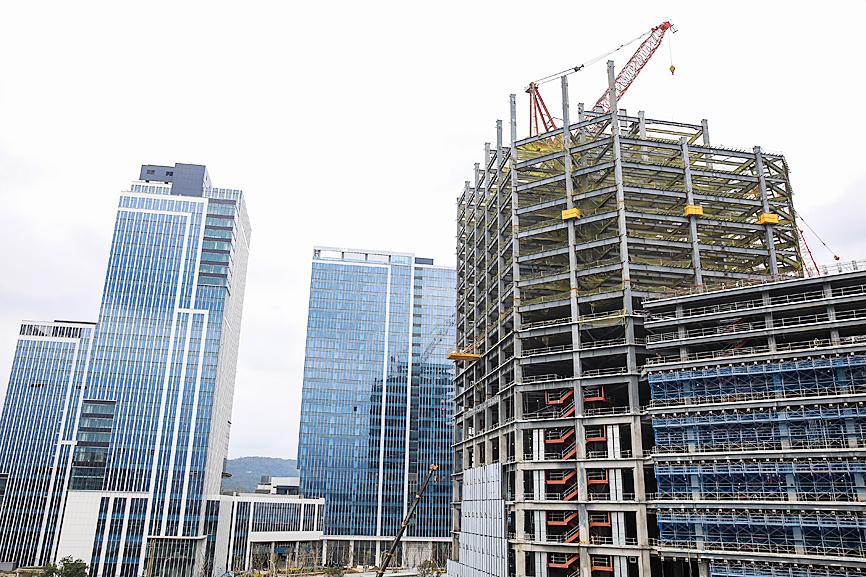Home transactions and housing prices could remain unchanged or rise slightly in the first half of next year due to a relatively high comparison base this year, Taiwan Institute of Economic Research (TIER, 台灣經濟研究院) research fellow Arisa Liu (劉佩真) said on Thursday.
This year, the property market continues to be supported by historically low interest rates in a market awash in ample liquidity, while many equity investors have chosen to lock in their gains and reallocate money to real estate, Liu said.
Many people buy homes to fend off inflationary pressure, Liu said, citing a survey in which 66 percent of respondents preferred to invest in real estate, while 37 percent preferred equity markets.

Photo: I-Hwa Cheng, Bloomberg
The preference for investing in real estate is expected to continue to shore up the local property market next year, she added.
Business sentiment among property developers last month weakened from September, TIER data showed, as few new projects were launched, while the delay of projects by some property developers also made the industry cautious.
However, property sales in Taiwan remained strong, Liu said, citing a sequential increase of 11.3 percent in commercial and residential property transactions to 23,810 units in the nation’s six special municipalities last month.
Transaction growth was largely due to eased concerns over a domestic outbreak of COVID-19 cases, which prompted many property investors and home buyers to jump into the property market, and helped to keep home prices at relative highs, she said.
The central bank is likely to follow the US Federal Reserve in an expected cycle of rate hikes in the middle of next year, although local rates are expected to remain lower than the US Fed’s, while the hikes’ effects are likely to be acceptable to the property market, Liu said.

UNCERTAINTY: Innolux activated a stringent supply chain management mechanism, as it did during the COVID-19 pandemic, to ensure optimal inventory levels for customers Flat-panel display makers AUO Corp (友達) and Innolux Corp (群創) yesterday said that about 12 to 20 percent of their display business is at risk of potential US tariffs and that they would relocate production or shipment destinations to mitigate the levies’ effects. US tariffs would have a direct impact of US$200 million on AUO’s revenue, company chairman Paul Peng (彭雙浪) told reporters on the sidelines of the Touch Taiwan trade show in Taipei yesterday. That would make up about 12 percent of the company’s overall revenue. To cope with the tariff uncertainty, AUO plans to allocate its production to manufacturing facilities in

TAKING STOCK: A Taiwanese cookware firm in Vietnam urged customers to assess inventory or place orders early so shipments can reach the US while tariffs are paused Taiwanese businesses in Vietnam are exploring alternatives after the White House imposed a 46 percent import duty on Vietnamese goods, following US President Donald Trump’s announcement of “reciprocal” tariffs on the US’ trading partners. Lo Shih-liang (羅世良), chairman of Brico Industry Co (裕茂工業), a Taiwanese company that manufactures cast iron cookware and stove components in Vietnam, said that more than 40 percent of his business was tied to the US market, describing the constant US policy shifts as an emotional roller coaster. “I work during the day and stay up all night watching the news. I’ve been following US news until 3am

COLLABORATION: Given Taiwan’s key position in global supply chains, the US firm is discussing strategies with local partners and clients to deal with global uncertainties Advanced Micro Devices Inc (AMD) yesterday said it is meeting with local ecosystem partners, including Taiwan Semiconductor Manufacturing Co (TSMC, 台積電), to discuss strategies, including long-term manufacturing, to navigate uncertainties such as US tariffs, as Taiwan occupies an important position in global supply chains. AMD chief executive officer Lisa Su (蘇姿丰) told reporters that Taiwan is an important part of the chip designer’s ecosystem and she is discussing with partners and customers in Taiwan to forge strong collaborations on different areas during this critical period. AMD has just become the first artificial-intelligence (AI) server chip customer of TSMC to utilize its advanced

Six years ago, LVMH’s billionaire CEO Bernard Arnault and US President Donald Trump cut the blue ribbon on a factory in rural Texas that would make designer handbags for Louis Vuitton, one of the world’s best-known luxury brands. However, since the high-profile opening, the factory has faced a host of problems limiting production, 11 former Louis Vuitton employees said. The site has consistently ranked among the worst-performing for Louis Vuitton globally, “significantly” underperforming other facilities, said three former Louis Vuitton workers and a senior industry source, who cited internal rankings shared with staff. The plant’s problems — which have not